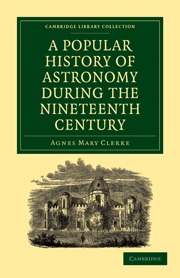Book contents
- Frontmatter
- PREFACE
- Contents
- INTRODUCTION
- Part I PROGRESS OF ASTRONOMY DURING THE FIRST HALF OF THE NINETEENTH CENTURY
- Part II RECENT PROGRESS OF ASTRONOMY
- CHAPTER I FOUNDATION OF ASTRONOMICAL PHYSICS
- CHAPTER II SOLAR OBSERVATIONS AND THEORIES
- CHAPTER III RECENT SOLAR ECLIPSES
- CHAPTER IV SPECTROSCOPIC WORK ON THE SUN
- CHAPTER V TEMPERATURE OF THE SUN
- CHAPTER VI THE SUN'S DISTANCE
- CHAPTER VII PLANETS AND SATELLITES
- CHAPTER VIII PLANETS AND SATELLITES (continued)
- CHAPTER IX THEORIES OF PLANETARY EVOLUTION
- CHAPTER X RECENT COMETS
- CHAPTER XI RECENT COMETS (continued)
- CHAPTER XII STARS AND NEBULÆ
- CHAPTER XIII METHODS OF RESEARCH
- INDEX
CHAPTER I - FOUNDATION OF ASTRONOMICAL PHYSICS
Published online by Cambridge University Press: 07 September 2011
- Frontmatter
- PREFACE
- Contents
- INTRODUCTION
- Part I PROGRESS OF ASTRONOMY DURING THE FIRST HALF OF THE NINETEENTH CENTURY
- Part II RECENT PROGRESS OF ASTRONOMY
- CHAPTER I FOUNDATION OF ASTRONOMICAL PHYSICS
- CHAPTER II SOLAR OBSERVATIONS AND THEORIES
- CHAPTER III RECENT SOLAR ECLIPSES
- CHAPTER IV SPECTROSCOPIC WORK ON THE SUN
- CHAPTER V TEMPERATURE OF THE SUN
- CHAPTER VI THE SUN'S DISTANCE
- CHAPTER VII PLANETS AND SATELLITES
- CHAPTER VIII PLANETS AND SATELLITES (continued)
- CHAPTER IX THEORIES OF PLANETARY EVOLUTION
- CHAPTER X RECENT COMETS
- CHAPTER XI RECENT COMETS (continued)
- CHAPTER XII STARS AND NEBULÆ
- CHAPTER XIII METHODS OF RESEARCH
- INDEX
Summary
In the year 1826, Heinrich Schwabe of Dessau, elated with the hope of speedily delivering himself from his hereditary incubus of an apothecary's shop, obtained from Munich a small telescope and began to observe the sun. His choice of an object for his researches was instigated by his friend Harding of Göttingen. It was a peculiarly happy one. The changes visible in the solar surface were then generally regarded as no less capricious than the changes in the skies of our temperate regions. Consequently, the reckoning and registering of sun-spots was a task hardly more inviting to an astronomer than the reckoning and registering of summer clouds. Cassini, Keill, Lemonnier, Lalande, were unanimous in declaring that no trace of regularity could be detected in their appearances or effacements. Delambre pronounced them “more curious than really useful.” Even Herschel, profoundly as he studied them, and intimately as he was convinced of their importance as symptoms of solar activity, saw no reason to suspect that their abundance and scarcity were subject to orderly alternation. One man alone in the eighteenth century, Christian Horrebow of Copenhagen, divined their periodical character, and foresaw the time when the effects of the sun's vicissitudes upon the globes revolving round him might be investigated with success; but this prophetic utterance was of the nature of a soliloquy rather than of a communication, and remained hidden away in an unpublished journal until 1859, when it was brought to light in a general ransacking of archives.
- Type
- Chapter
- Information
- A Popular History of Astronomy During the Nineteenth Century , pp. 161 - 184Publisher: Cambridge University PressPrint publication year: 2010First published in: 1885



